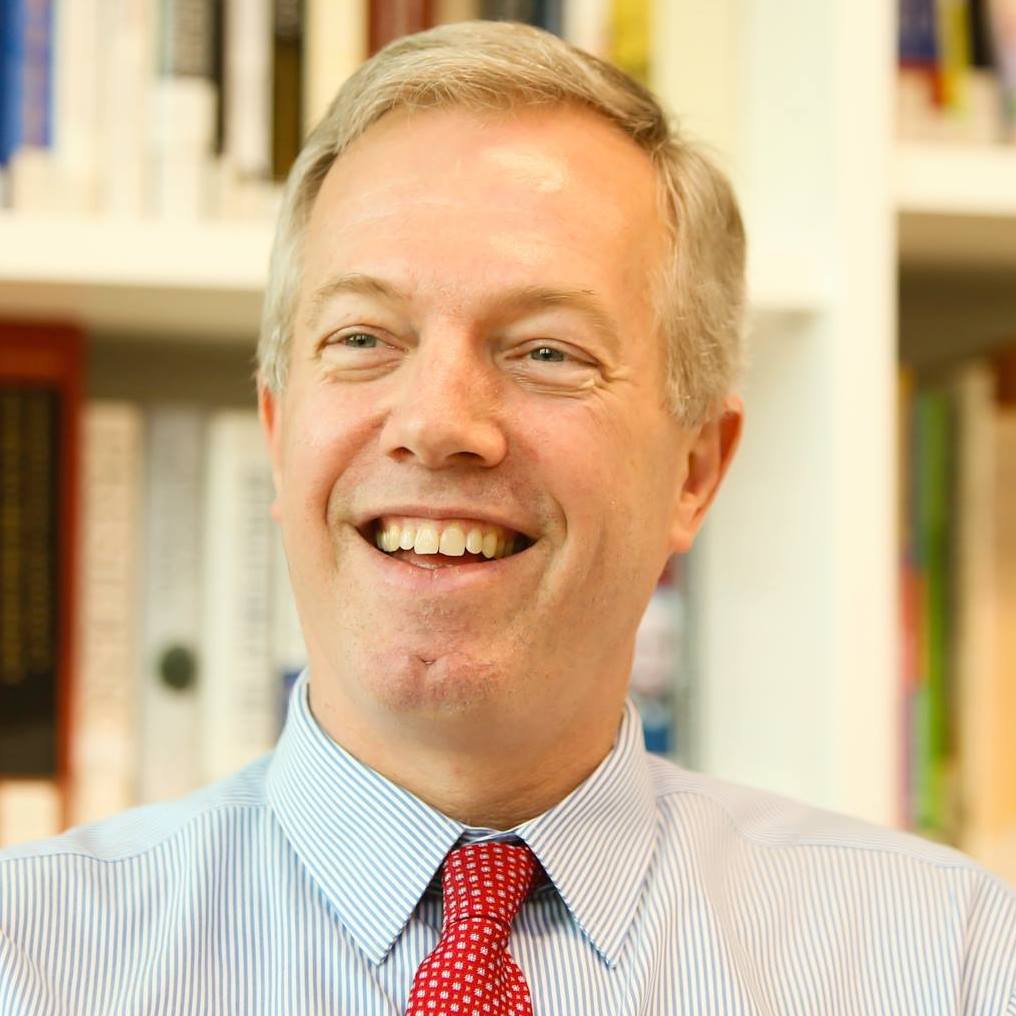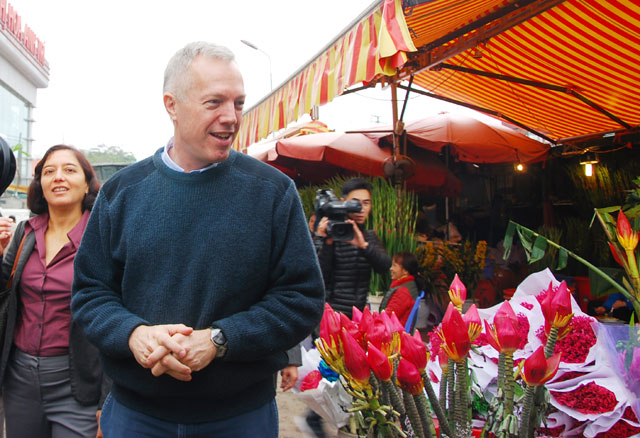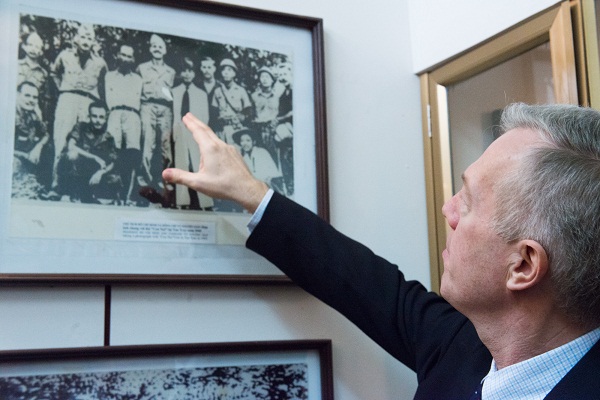Opinion
[Vietnam-US relations] Harris trip can accelerate the progress Vietnam and the US have already made
Jul 29, 2022 / 04:21 PM
"Vice President Harris has an opportunity to show that the US is back - not just in the security realm but in trade, too."
Vietnam-US relations have shown strides over the last two decades with tireless efforts by top leaders.
On this occasion, The Hanoi Times introduces insights into the relationship that has been built by sincerity, trust, and understanding.
Former US Ambassador to Vietnam Ted Osius said Harris trip can accelerate the progress Vietnam and the US have already made.
In his nearly thirty-year career at the US State Department, Ted Osius spent quite some time working with Vietnam, first in the 1990s when he helped open the US Consulate General in Ho Chi Minh City and then from 2014 to 2017 as the US ambassador to the country, which, as his website stated, he has fallen in love with since the 1990s.
The former diplomat shared with The Hanoi Times some memorable stories during his tenure in Vietnam, as well as his expectations about the relationship between Vietnam and the US, especially in the lead-up to US Vice President Harris's visit to Vietnam this week.
Your tenure as US ambassador to Vietnam witnessed many key milestones in the two countries’ ties. Can you share some of your most memorable things during your tenure?
Facilitating General Secretary Nguyen Phu Trong’s meeting with President Barack Obama in July 2015 was the most consequential accomplishment of my tenure as ambassador. The Oval Office meeting broke historic ground. The President and General Secretary issued a joint statement after the meeting that included a commitment to “respect . . . each other’s political systems,” a key commitment. The two leaders made other significant pledges, such as continuing party-to-party dialogues, dioxin cleanup, human rights, educational exchange, and finishing TPP negotiations.
At a State Department lunch to honor the General Secretary, Vice President Joe Biden said, “Thank heaven we are here today. To see the sun through parting fog and clouds” (Troi con de co home nay. Tan suong dau ngo ven may giua troi). Biden’s use of a quote from Truyen Kieu, Nguyen Du’s epic poem, followed the respectful example President Clinton had set in his Hanoi remarks in 2000. Later, when Dr. Jill Biden visited Hanoi, Vietnam’s First Lady Mai Thi Hanh greeted her at the Temple of Literature with a traditional conical hat woven by local women in Hue. When held up to the light, the hat revealed the words spoken by Vice President Biden at the State Department.
In the two years after the General Secretary’s visit to Washington and New York, the two nations expanded bilateral collaboration in multiple areas, including security, education, science and technology, health, and the environment.
You also contributed to the successful trip of President Barack Obama to Vietnam in 2016, What were, for you, the most special things about the visit?
In Ho Chi Minh City, a million people swarmed into the streets to welcome President Obama and watch his motorcade pass by. “In seven and a half years of travel,” the president said, “with the possible exception of Tanzania, I have never received a warmer welcome”.
President Obama’s Ho Chi Minh City stop highlighted a young, dynamic, and friendly Vietnam. He turned the established order on its head when he interviewed young entrepreneurs who used digital platforms to sell goods. In Asia, it was almost unthinkable for the leader of the free world to ask questions of young businesspeople. Then-President Obama answered questions—unscripted—at a gathering of six hundred young Vietnamese, members of his Young Southeast Asian Leaders Initiative.
A woman in her twenties, Suboi, introduced herself as a rapper. Not missing a beat, Obama asked, “Why don’t you give me a little rap? Let’s see what you got.” To encourage her, he added, “Come on. Do you need like a little beat? Badoom, badoom.
Suboi grinned and began to rap a funny song. “Some people have a lot of money, and big houses, but are they really happy?” she rapped. “It’s been a crazy day.” She told the president that a lot of people in Vietnam think rapping isn’t art and that it’s not for women.
Her song and words went viral on social media, helping define the visit’s significance. Overseas, television viewers expected to see Vietnamese communists in baggy green uniforms. Instead, they saw a hip young female rapper. Modern Vietnam had arrived.
So from your experience, how do you think of the US Vice President’s trip to Vietnam and its significance to the US-Vietnam relationship?
Vice President Harris has an opportunity to show that the US is back - not just in the security realm but in trade, too. Trade is a natural starting point for re-engaging the Indo-Pacific. With a population of 662 million and a GDP of US$3.2 trillion, the ten nations that comprise the Association of Southeast Asian Nations (ASEAN) are critically important to the US and to sustaining its post-COVID economic rebound. The US private sector invested more than US$338 billion in ASEAN in 2020, more than in China, India, Japan, and South Korea combined. In the same year, the US exported more than $122 billion in goods and services to ASEAN -- fourth after Canada, Mexico, and China.
ASEAN, and especially Vietnam, are at the heart of a network of Indo-Pacific free trade agreements (FTAs), with FTAs in place with the region's biggest economies. The recently signed Regional Comprehensive Economic Partnership Agreement includes all ASEAN countries and six other Indo-Pacific nations. Four ASEAN members—Brunei, Malaysia, Singapore, and Vietnam — have signed the Comprehensive and Progressive Agreement for Trans-Pacific Partnership.
America’s technology industry has discovered that ASEAN is the world’s fastest-growing internet market, with a digital economy projected to exceed US$300 billion by 2025. It’s worth noting that, in only six months, Singapore concluded a Digital Economy Partnership Agreement (DEPA) with Chile and New Zealand -- an agreement that establishes new approaches to digital trade issues, promotes interoperability between different regimes, and addresses the new issues brought about by digitalization, such as cross-border data flows.
The US could move quickly on a sectoral agreement such as DEPA and there are ready templates that can form the basis for such negotiations, including the US-Mexico-Canada trade agreement, the U.S.-Japan digital trade agreement, and the former Trans-Pacific Partnership. I hope Vice President Harris indicates US plans for a revived, pro-active, and positive trade agenda with Vietnam and with ASEAN.
In Vietnam, America’s first female vice president may find inspiration from the path-breaking women in Vietnam’s history, including the Trung sisters and Ba Trieu. As a woman warrior in the third century (225–248 CE), Ba Trieu is known as Vietnam’s first feminist. According to history, she raised an army and fought more than thirty battles before she was twenty-one years old. She said: “My wish is to ride the tempest, tame the waves, and kill the sharks in the East Sea. I will not resign myself to the usual lot of women who bow their heads and become concubines.”
When she visits Vietnam, Vice President Harris can accelerate the progress we have already made toward becoming close friends and partners, and she can point the way toward deepening our relationship and continuing the process of reconciliation.
Ambassador Osius talks about a photo in which OSS Deer Team stands with General Vo Nguyen Giap and President Ho Chi Minh. |
What can you say about the Vietnam-US ties until now? And the potential to develop this relationship in the time ahead, especially after the trip of Mrs. Kamala Harris?
As the global economy’s center of gravity shifts more decidedly toward Asia, alliances and partnerships in the region are becoming increasingly critical to the US. The Vietnamese are pleased to partner with the US, especially in tackling shared challenges, including climate change, pandemic disease, disruptive technologies, and economic and financial challenges. On her trip, Vice President Harris can show respect for Vietnam while deepening collaboration on common challenges.
Many Vietnamese marvels that Vice President Harris is a woman of Black and Asian descent, who manifests the words in our Declaration of Independence that apply to all Americans. Inspired by Thomas Jefferson’s words, early in 1945 Ho Chi Minh asked friends in the OSS (precursor of the CIA) for a copy of America’s Declaration of Independence, which was air-dropped into his jungle camp. Ho then borrowed from our founding document when he announced Vietnam’s independence in August 1945 in Hanoi’s Ba Dinh square, declaring, “All men are born equal: the Creator has given us inviolable rights, life, liberty, and happiness!”
The Vice President’s trip comes in the midst of the pandemic. How could it contribute to the US – Vietnam cooperation in public health?
The Biden-Harris administration has provided millions of Covid vaccines to Vietnam. Together with former ambassadors, I had written and urged the President to provide vaccines to Vietnam. I hope this collaboration on overcoming Covid will continue.
There is a rich history of public health cooperation between the US and Vietnam. Since the early 2000s, our countries have worked together to combat SARS and HIV/AIDS. Many Vietnamese epidemiologists were trained in the US. Major emergency operation centers in the Northern, Central, and Southern parts of Vietnam have collaborated via real-time data sharing with the US Centers for Disease Control (CDC).
Vietnam’s public health system has developed rapidly, as demonstrated through the country’s initial responses to Covid-19. Vietnam was among the world’s best.
While the Delta variant has been tough on every country, including the US and Vietnam, Vietnam is ramping up and getting as many people in Ho Chi Minh City vaccinated as possible this month. I believe the US government will continue to be a strong partner of Vietnam on Covid-19 emergency response and post-pandemic recovery.
Vice President Harris’ visit is an opportunity to promote that collaboration even further.
There is an important role for the private sector, too. The US-ASEAN Business Council is part of a global task force, dealing with providing oxygen to some of the countries that were hit the hardest, as well as diagnostics and health kits. This effort is led by some of America’s biggest companies. US-ABC is a critical member of this coalition. The current focus is on Indonesia, as it is the epicenter of the pandemic right now. Companies are also looking at what they can do in Vietnam, Thailand, Myanmar and other Southeast Asian countries hit hard by this new Delta variant.
Challenges remain. Currently, companies cannot buy, distribute and donate vaccines. I hope over time, as pharmaceutical companies increase their production, the private sector will be able to contribute directly to vaccine distribution. I look forward to that day.
Thank you for your time!
A book by Ted Osius on the U.S.-Vietnam relationship throughout the last 25 years is expected to be published this October. “Nothing is Impossible: America’s Reconciliation with Vietnam,” tells the story of the past 25 years of reconciliation that Ted Osius witnessed and sometimes played a part in. Today, Vietnam is one of America’s strongest international partners, with a thriving economy and a population that welcomes American visitors. How that relationship was formed is a 20-year story of daring diplomacy and a careful thawing of tensions between the two countries after a lengthy war that cost nearly 60,000 Americans and more than three million Vietnamese lives. Ted Osius offers a vivid account, starting in the 1990s, of the various forms of diplomacy that made this reconciliation possible. He considers the leaders who put aside past traumas to work on creating a brighter future, including senators John McCain and John Kerry, two war veterans and political opponents who set aside their differences for a greater cause, and Pete Peterson—the former POW who became the first US ambassador to a new Vietnam. Osius also draws upon his own experiences working first-hand with various Vietnamese leaders and traveling the country on a bicycle to spotlight the ordinary Vietnamese people who have helped bring about their nation’s extraordinary renaissance. The book with a foreword by former Secretary of State John Kerry, has an official release date of October 15, but it will be shipped in early September to those who have pre-ordered. |












